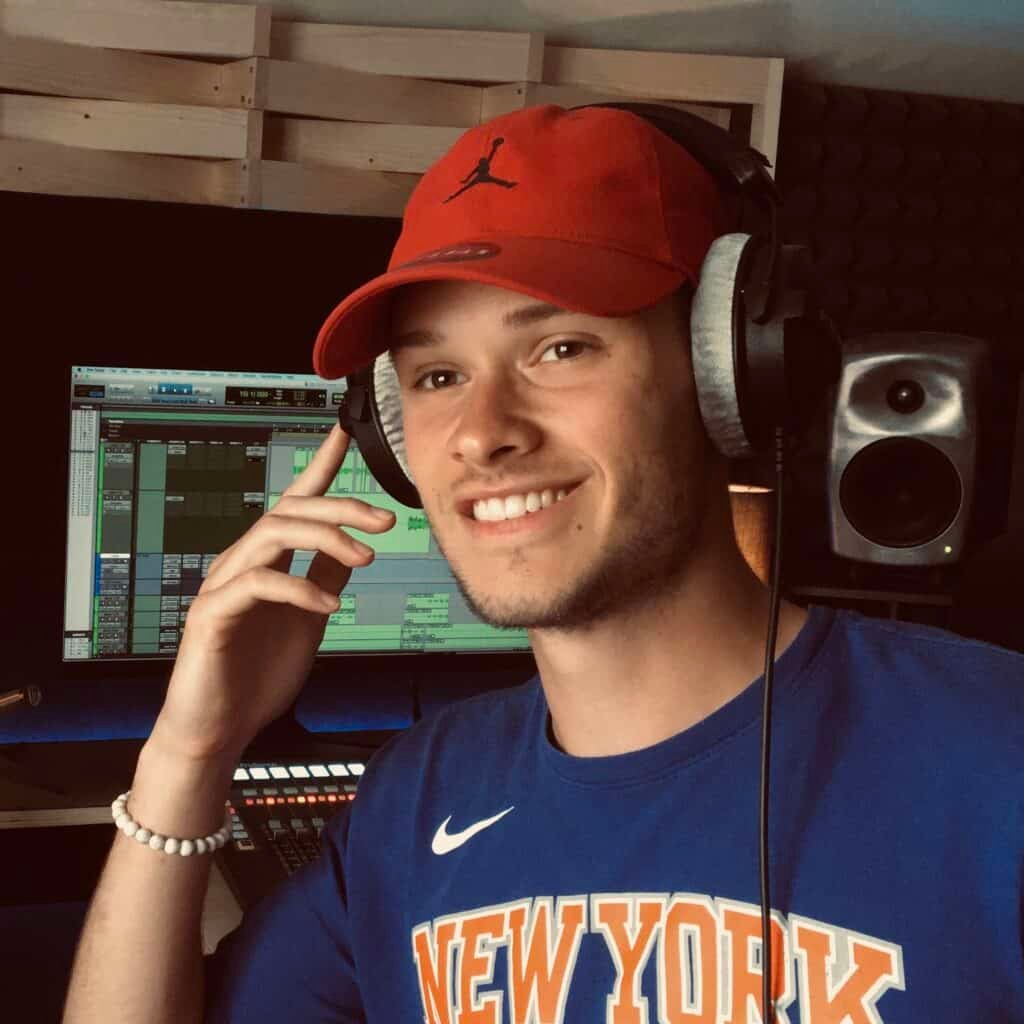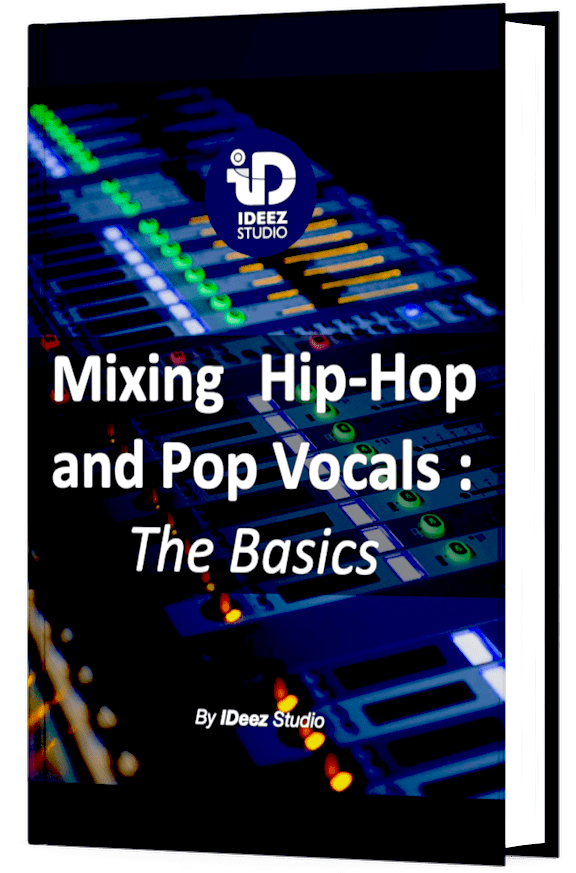Are you a beginner in the field of music mixing? Would you like to know how to start mixing music the right way? In this article, I’ll give you all my most valuable tips to get you started in this field.

Here’s what you should do to start mixing music as a beginner:
- Learn how to use your DAW properly
- Focus on balance first
- Use simple tools
- Don’t use too many plugins
- Use references
- Don’t be afraid to make mistakes
- Seek feedback from professionals
- Be willing to learn everyday
What is Music mixing?
Before getting into the heart of the matter, I first wanted to make sure that the term music mixing is well understood. Because the term is often confusing for amateurs and therefore slows down the learning process quite a bit.
Music mixing is the process of mixing different recorded music tracks and coming up with something that sounds clean and unified. It is the process that comes just before mastering, which consists in processing the whole mix to make the piece frequency-wise and dynamically playable.
Need a professional sound engineer specializing in pop and hip-hop mixing ? Great! Take a look at our services and let’s blow up your career together!
Let’s start now!
Learning to mix music isn’t easy
In the field of music production (in the broadest sense), mixing is probably one of the most difficult skills to acquire. It requires training, patience, methodology,… In short, a lot of time!
But what takes time is mastering this skill to the point of becoming a sound professional. Because in reality, having the basics doesn’t take that much time, what’s important is the method of learning when you start.
The tips I’m going to give you are not tips that aim to increase the quality of your mixes to the point that they sound professional. The goal is to give you the strongest possible foundation to move in the right direction.
Knowing this, I assume that you are either at the very beginning of your learning process in music mixing, or that you haven’t really started to get interested yet.
Either way, I’m sure these tips will help you take a big step forward. All of these tips come from my personal experience as a pro mixing engineer. But also from the experience of other sound engineers I’ve met in the last few years.
Let’s get started!
1. Learn how to use your DAW properly

In music mixing, your DAW is your main working tool. It is the heart of all the audio processing you will give to your future mix. If you don’t master your DAW properly, you can be sure that everything that comes out of it will be of poor quality.
So it’s THE first thing to do before diving into more technical stuff. In fact, I don’t recommend learning more advanced music mixing techniques if you don’t yet know how to use your DAW in a fluid way.
I know, it’s like, super frustrating! Because, like a lot of people starting out in this field, you want to jump right in. But if you skip this step, I promise you one thing: your learning curve will be 2 to 3 times slower. Not great!
If you’re going to use Pro Tools for your future mixes (very good choice!), I recommend you to take the super complete training from a sound engineer called MusicTechHelpGuy. This course is more than 6 hours of videos separated in several chapters that will make you take a giant step in Pro Tools knowledge.
The link to this playlist is right here. I also put you his first video below:
2. Focus on balance first

As soon as you have learned the important basics of your DAW (if you haven’t already, of course), you can finally focus on what we are interested in: music mixing.
This is where one of the most important principles in music mixing comes into play: getting the balance right. This step of the process will always be the most important, no matter what you do afterwards. It will guide all your mixing choices.
Yet, nowadays, this step is often neglected. This is because, a few decades ago, mixing consoles were ALWAYS the center of audio processing. Balancing through the physical faders was therefore inevitably the first step in mixing.
But today, the center of our attention, for many, amateurs and professionals alike, is the screen. The balance is therefore automatically pushed to the status of a secondary step, which is a mistake.
Without a good balance, the ears and the brain will not be able to draw a final picture of the mix. Not making this step a priority can quickly get in the way.
Keep this in mind: Balance first, process later.
ℹ️ Do you feel like your mixes sound amateur? I might know why… I’ll give you all the answers here: Top 10 Reasons Why Your Mixes Sound Amateur
3. Use simple tools

Quality tools are always very attractive. And the field of music mixing is probably one of the areas where this is most pronounced! Plugins, mixing consoles, hardware compressors,… All this makes you want to use all these tools!
But, despite what too many mixing enthusiasts may think, gear is not what makes a good mix! It’s a trap you should never fall into, especially not at the beginning of the learning process.
Pro plugins such as FabFilter, Ozone, UAD or Waves will always bring a little extra to the sound you’re processing, but only if they are used in the right way. On the other hand, a poorly used pro plugin can completely ruin an entire mix.
What you should try to understand as soon as possible in the learning process is that it’s not the plugins that make the mixes, it’s the mixing engineer behind them. The plugins are only there to help the engineer in his/her process.
It’s true that all these plugins from these big brands may seem magical in videos or mixing tutorials. But in reality, no, no plugin is magic. They are simply used in the right way.
This leads us to a crucial piece of advice for all music mixing beginners: Use simple tools. Free plugins do not necessarily mean bad plugins. On the other hand, many of them are of very good quality!
Now, you might ask yourself a question: When will I know that I need to use pro plugins? To that I answer something very simple: You will feel it in time. When you really need more advanced tools and plugins, you will feel that there is a barrier. And then you will be able to go to the next step without any worries.
4. Don’t use too Many plugins

In addition to the plugins you use which, as mentioned above, must remain simple to use, you also have to limit the number of plugins you use. Indeed, if you use too many plugins, you risk getting lost in the way each one works and slowing down your progress in mixing.
On top of that, you also risk lowering the final quality of your mixes. Since the more you use, the less you will be able to master each of them completely. You can use the best plugins in the world, if you don’t manage to use them properly, you will never get good results from your mixes.
Keep in mind that the quality of a mix will always be better by using plugins you know well. Even if they are of “lower quality”. The person or engineer in front of the screen will always take precedence over the quality of the plugins at his/her disposal.
Even if it sounds ridiculous, I advise you to use a maximum of 7 plugins for all your mixes:
- EQ to get rid of unwanted frequencies.
- Compressor to give more warmth and robustness to your tracks
- De-esser to reduce the energy of sibilant sounds in vocal tracks.
- Reverb to create a space and a universe within the mix.
- Delay to add extra energy in the background of the track.
- Auto-tune plugin if you work in hip-hop or rap music.
- Extra reverb or delay to create depth in your mix.
I know, it’s also something that can be frustrating when you want to discover all the little techniques of music mixing. But it will speed up your progress faster than you think! It will also increase the overall quality of your mixes.
ℹ️ Want to improve your vocal mixing skills? This article should help you a lot: Vocal Mixing : 9 Simple Tips To Improve Quickly
5. Use references

You may have wondered, while reading this article, what “references” were. Well, in fact, it’s simply professionally mixed tracks that you use as reference to calibrate your mixes.
Using references is a very common thing, even in the professional world. Professional sound engineers use this principle to rebalance their mixes and rework the overall frequency spectrum.
To use this principle to good effect, I suggest you create a small compilation of 3 to 4 minutes that includes about 15 samples of reference tracks. This compilation, to be usable and efficient, must ideally respect some conditions:
A. Audio quality
For optimal use, the references must be of impeccable quality. Don’t go converting YouTube videos into mp3s and expect them to be good references. The quality of the converted files would be extremely bad.
The best thing is to have CD references. And even if CD is clearly not the center of the music industry anymore, it is still the medium that delivers the best quality. If you have the ability, you can import CD samples into your DAW and build your compilation from there.
B. Genre
This may sound quite logical, but the genre of your references must be adapted to the genre of the song you are mixing. You would never use a soul song as a reference to mix pop, and vice versa.
If you work in several genres of music, there is nothing to stop you from making a varied compilation and picking from the genre that suits your mix.
C. How well do you know the sound of each track?
The reference tracks should be tracks that you know well and whose balances and spectral color you naturally know.
You should of course enjoy the mix of these tracks, as they will be the reference for your next musical mixes.
6. Don’t be afraid to make mistakes

In our modern society, mistakes have become almost taboo. Many of us have grown up in a culture where mistakes are to be avoided at all costs. Thinking like that closes the doors to faster and more efficient growth.
Indeed, you will never learn by not making mistakes, especially in the field of music mixing. The goal is obviously not to make mistakes in a quasi-voluntary way, but to force yourself to make choices 100% assumed.
By doing things by halves, you will never be able to identify the potential mistakes you are making, nor the right mix choices. In other words, this is the way to slow and inefficient progress.
When I give this advice, I often refer to the way Chris Lord-Alge, a legendary sound engineer in the music business, handles his mixes. He goes all out and isn’t afraid to push the knobs to the extreme. He’s clearly an example to follow!
ℹ️ When you compare an amateur mix to a pro mix, some generalities stand out. I’ll tell you more about them in this article: 5 Things That Differentiate An Amateur Mix From A Pro Mix
7. Seek feedback from professionals

Having external feedback on the overall quality of your mixes is more than essential for good learning. You could feel like you’re going in the right direction and not be doing it right at all, without knowing it!
This is why getting feedback from your mixes is so important. But of course you shouldn’t ask just anyone. Professional sound engineers will (logically) always be in the best position to judge your mixes.
Of course, you’ll tell me that finding a sound engineer with the time to give feedback on your mixes is not easy, and I understand you! But you should still try to find someone who has a good enough ear and experience to give constructive feedback.
A good musician or an experienced producer, for example, will always be in a good position to judge a mix.
9. Be willing to learn everyday

As I said at the beginning of this article, learning the basics of music mixing doesn’t take as long as mastering it. But that doesn’t mean that it will only take a few hours and that you will be good at it!
In fact, what you have to understand is that it’s not the technical aspect that takes a lot of time. It is the purely physiological aspect. It is not the mastery of the tools that is at stake, it is the mastery of what your ears hear.
The stake is very largely in the capacity that your ears and your brain will have to analyze the sound in an accurate way. As you can imagine, this requires a lot of training and patience.
Indeed, training your ears to mix is the most complicated part of the whole learning process, so you have to be ready to practice every day to speed up the “training” of your ears to music.
Now you might ask yourself the following question: How do I train my ears? To that, I’ll answer something very simple: Mix music, over and over again. You are your own best mixing teacher. You will learn by practicing.
But it doesn’t have to be passive mixing. In the sense that if you never question your mixes and you mix without questioning, you will not progress. Around the simple fact of mixing, you must also apply the advice already mentioned in this article. And then you will see a real progress!
Need a professional sound engineer specializing in pop and hip-hop mixing ? Great! Take a look at our services and let’s blow up your career together!
Let’s start now!
Conclusion
The best way to start mixing music as a beginner is to practice mixing as much as possible. Around this, you will also need to learn how to use your DAW properly, how to make good balances, how to use simple tools and plugins and how to use everything at your disposal to increase the quality of your mixes faster.
Learning to mix takes time and energy, let’s face it. But anything you can get your hands on that will improve your mixing skills is worth taking without hesitation. Learning must be active at all costs.
If you have any questions about this topicor about anything in the field of music mixing, please contact me, I’m always very happy to help!
Related Articles:
My favorite tools for mixing pop and hip-hop music:
Plugins
In the field of auto-tune, I’m convinced that nothing’s better and more efficient than Antares Auto-Tune Pro. As for the EQ’s, FabFilter Pro-Q3 and Slate Digital Infinity EQ are, in my opinion, the best tools. For compression, I have 2 favorites plugins: Waves RComp and UAD EL8 Distressor.
As for reverb, I’m a big fan of the Soundtoys Little Plate, but generally, I go for the Valhalla VintageVerb for its versatility. I also love the Arturia Rev PLATE-140 and the UAD Pure Plate for its organic side.
Headphones
The closed headphones I love and will always love using for mixing pop and hip-hop music are the Beyerdynamic DT-770. As for the best open-back headphones, I use the Sennheiser HD600 headphones, and I’m really happy of them!
Monitors
Having a pair of Yamaha HS7 in its studio or home studio is always cool for more excitement while listening to your mixes. The Adam Audio T7V monitors are also super accurate. In my studio, I also have a pair of Genelec 8030 for their reliability.
Hardware gear
For anyone who wants to start using hardware in their mixes, I always recommend these 2 units from Klark Teknik: the EQP-KT and the 76-KT. Don’t forget to use good converters, such as the Apollo interfaces. This is essential for a good rendering.







